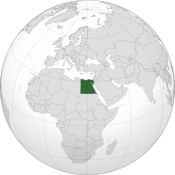Egypt anti-government protests continue, Internet shut down
Friday, January 28, 2011
Anti-government protestors in Egypt rallying against the rule of president Hosni Mubarak took to the streets for a fourth straight day, demanding the long-time leader step down and complaining of poverty, corruption, and oppression. The demonstrations were supposedly inspired by a popular uprising that saw Tunisian president Zine al-Abidine Ben Ali ousted from office. A national curfew is in effect, but is being ignored by many.

Image: Muhammad Ghafari.
Tens of thousands of people spilled out into streets after Friday prayers today, chanting slogans like "Down, down with Mubarak" and "The people want the regime to fall". At least eighteen people died in the violence between riot police and protestors, with hundreds more wounded. Up to a thousand people have been arrested.
Police responded to protestors by deploying rubber bullets, tear gas, and water cannons. In addition, Mubarak ordered the army out onto the streets to help quell the conflict. He was earlier supposed to make a statement, but hasn't yet done so.
In Cairo, demonstrators targeted the heavily-guarded state broadcasting building, as well as the building of the ruling National Democratic Party, which was set on fire, according to a BBC reporter. In Sinai, armed men took several policemen hostage after seizing a road leading into a nearby town.
Former International Atomic Energy Agency head Mohamed ElBaradei, a prominent opposition figure, was taken into custody by authorities and now under house arrest, The Telegraph reports.
Internet shutdown
HAVE YOUR SAY
|
|
Have you been affected in some way by this unrest? Tell us your thoughts.
| |
Meanwhile, according to media reports and statistics, Egypt has shut down practically all Internet traffic both out of and into the nation, as well as disrupting cellphone usage. A graph by Arbor Networks available on the New York Times website shows an almost vertical drop in overall Egypt internet traffic, starting shortly before four o'clock in the afternoon with over 2.5 million megabits per second down to almost zero in the space of an hour.
"Almost nobody in Egypt has Internet connectivity, and there are no workarounds. I’ve never seen it happen at this scale," said the chief technology officer for Renesys, a company that tracks Internet traffic. "In a fundamental sense, it’s as if you rewrote the map and they are no longer a country. I never thought it would happen to a country the size and scale of Egypt."
Andrew Noyes, spokesman for Facebook, noted that the social website had seen almost all of its Egypt traffic disappear and there is only a "minimal" amount left. In a statement, Noyes said: "Although the turmoil in Egypt is a matter for the Egyptian people and their government to resolve, limiting Internet access for millions of people is a matter of concern for the global community."
Vodafone announced on its website that "all mobile operators in Egypt have been instructed to suspend services in selected areas. Under Egyptian legislation the authorities have the right to issue such an order and we are obliged to comply with it."
Related news
- "Massive anti-government protests in Egypt continue into second day, several killed" — Wikinews, January 27, 2011
Sources
- "Egypt protests: Curfew in cities as army deployed" — BBC News Online, January 28, 2011
- "Egypt protests: President Mubarak sends in the army to Egypt's burning streets" — The Telegraph, January 28, 2011
- Matt Richtel. "Egypt Cuts Off Most Internet and Cell Service" — New York Times, January 28, 2011
- "Vodafone says Egypt ordered all cellphone operators to suspend service in some areas" — The Canadian Press, January 28, 2011


